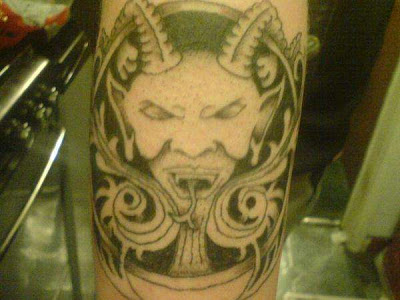A gargoyle tattoo has become an increasingly popular request among tattoo enthusiasts. A tattoo artist will generally use a black ink with an intricate shading technique to create this monotone piece of art.
Gargoyles are architectural stone carvings resembling a mythological creature or even a human form. In Medieval times they helped in warding off evil spirits and protected the buildings they resided on. Celtic styles incorporated Green Men - human heads with branches and foliage - to be a sign of divinity. Gothic cathedrals used stone gargoyles as a water spout to direct water away from the sacred building.



Sometimes, a gargoyle tattoo depicts a combination of animals. These mythological creatures were called 'chimera'. The griffin is another well known tattoo that merges the features of an eagle's wing and a lion's head together that represents dignity and nobility.
Human skulls are also sometimes used within gargoyle tattoos and are believed to protect the wearer from an early death. Therefore, a person who chooses to wear a tattoo does not merely do so as a fashion statement but because they believe in traditional values.



Some gargoyles are depicted as a demonic creature with talons, tails and horns and elongated ears. Gargoyle tattoos can also be a combination of ram, boar and felines.
A gargoyle tattoo is usually done in Gothic styles in darker shades of brown, gray or black. It is normally posed in a hunched stance. They are often depicted with a scary face with fangs and unfriendly temperament sitting alone atop tombstones, castles or churches.



Quite a few gargoyle tattoos will blend gargoyles from different cultures and eras, to form a truly unique design. These tattoos could depict a Japanese gargoyle sitting alongside a Celtic gargoyle as well as a European gargoyle, creating a disconcerting yet great effect.
Gargoyle tattoos might appear to be grotesque and scary in their appearance but their true nature is quite the opposite.
Subscribe to:
Post Comments (Atom)

0 comments
Post a Comment